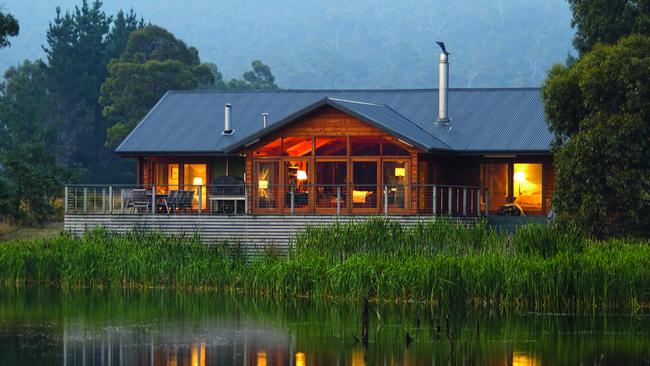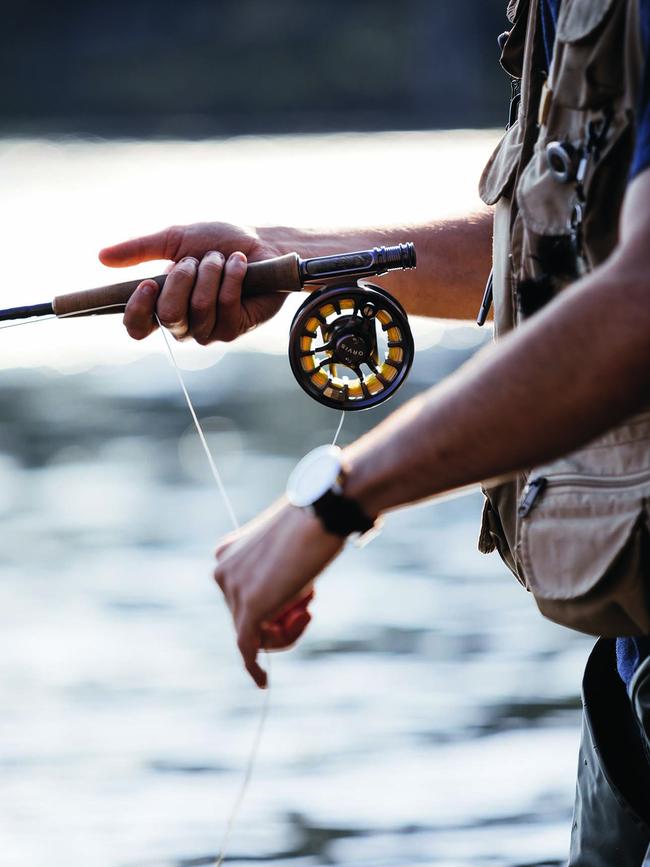Currawong Lakes fly fishing retreat, Tasmania
Lose yourself in the gentle rhythms of fly fishing at this Tasmanian lake retreat.

As we drive into the Currawong Lakes fly fishing retreat in Tasmania’s eastern highlands, it occurs to me that I might not be the ideal correspondent for this gig. The noble virtues of fly fishing have been attested to by legions of manly men, from British poet laureate Ted Hughes to novelist Tom McGuane and our own Robert Hughes. Me, I’ve always felt a pang of sympathy for the fish, dangling off the line and drowning in air with a steel hook pinned through its jaw. Even before we set off to the airport, my devoutly vegetarian daughter looked at me askance.
Our tutor at Currawong Lakes, Richard Krimmer, is having none of this tosh. “Don’t worry, they can’t feel it,” he says cheerfully as he fastidiously prepares the tackle on our first morning. “For them it’s like having a haircut.” In any case, Krimmer — a 54-year-old who’s been fly fishing since he was a teenager — is an old-school fisherman who encourages his clients to set their catch free, believing the satisfaction of fly fishing is in the pursuit rather than the eating.
Krimmer and his wife Meryn bought Currawong Lakes, a heavily forested 800ha property at the end of a 12km dirt road, after stumbling across it two years ago while reading the Home Hunt section in this magazine. The property had previously been a working farm, a trout fishery and a game park where shooting enthusiasts blasted away at deer and quail. Its four timber cabins and spacious Owner’s Lodge overlook three lakes fed by Halls Creek and the surrounding hills where wallabies and deer range free. The Krimmers have refurbished the place to create a more peaceful retreat focused on fishing, although the elaborate clay-shooting range is still open to gun enthusiasts.

We’re staying in the Owner’s Lodge, a sprawling three-bedroom residence that features a large timber-panelled central living area with a huge stone fireplace and a sweeping view of Long Marsh Lake and surrounds. The lodge is brilliantly well equipped and although no meals are provided, the kitchen contains basic cooking supplies and the all-important Nespresso coffee machine. Two bedrooms open to a deck that overlooks the lake, a perfect spot in the evening to sit and listen to the birdsong and the splash of jumping trout.
A three-hour lesson with Richard includes all the necessary equipment, and he proves to be a patient and good-humoured teacher, fly fishing being a tricky art for the novice. “So let’s assume you know nothing,” he begins cheerfully, flipping open a small case to reveal a collection of what appear to be brightly coloured dead insects but are in fact artificial imitations made from delicate nylon fibres and bird plumage. His choice today is the idiot-proof “woolly bugger”, a lure so attractive to your average trout that some fishermen joke that it should be banned.
After Richard demonstrates his own graceful casting technique, which propels the line forward in a fluid 50m arc, your correspondent and his wife spend 20 minutes clumsily imitating him, with mixed results. “You’re both going pretty well,” he encourages. “Now you’re going to go to the water and forget half of what you just learnt, but that’s OK.”

Out on the lake, waist-deep in our waders, Richard makes the first cast for me then hands me the rod; within seconds a trout grabs the fly, prompting me to jerk the rod back with precisely the sudden movement I’ve been told to avoid. Sure enough, the fish wriggles free of the hook and I reel in an empty line, not for the last time. Five minutes later my wife Susan repeats this rookie error.
Ted Hughes vouched for fly fishing as a communion with “levels of yourself that are deeper than the ordinary self”, which is a poetic way of saying that nothing much happens a lot of the time. You cast out, you stare at your line or your fly bobbing on the water, you scan the lake’s surface for phantom signs of life, and very often you drift into a pleasant reverie. In our case, it’s a reverie rarely interrupted by actual trout, which appear to be immune even to the charms of the woolly bugger on this particular morning.
Fly fishing aficionados can spend endless hours musing on trout psychology and debating which fly is best suited to the conditions. Should it be a Klinkhammer Special? A Parachute Adams? Maybe even a Bitchslap Shrek? Readers fascinated by such questions are directed to Frank O’Leary’s 220-page book Art of the Fly, which gives detailed instructions for using feathers, animal hair, nylon and tinsel to construct 50 different miniature lures, thus proving that Obsessive Compulsive Disorder can be overcome with remedies far cheaper than psychotherapy.
Richard might have raised our expectations when he mentioned that the previous day, one of his novice pupils — a nurse with zero fishing experience — had hooked four trout and reeled in two. After two hours, my casting has become almost passable but I’ve twice failed to turn a nibble into a catch. Along the way I’ve discovered myriad ways of getting a fish hook tangled in reeds, clothing and its own line.
Finally, after three hours, a shriek erupts to my right as Susan feels her line tug; Richard reminds her to let the fish take the hook and swim off before she begins tightening the line. Five minutes of to-ing and fro-ing ensues, a reel‑in-and-reel-out game designed to exhaust the fish, until Susan hauls in a very surprised-looking rainbow trout. “It’s a big one,” Richard says approvingly as he expertly collects the fish in his net and whips out his phone to take a snap.
We’re not planning to eat the fish, but a photo is surely essential. As Richard aims his camera, Susan lifts her slippery prize from the net — its cue to flap violently, wriggle from her grasp and plop back into the lake before Richard can snap its portrait. I’d swear the fish had pulled that trick before. Honestly, though, that trout was … this big.
Currawong Lakes Fly Fishing Retreat: bush cabins $225 (two bedroom) or $325 (four bedroom) per night; Owner’s Lodge $600 per night. Tuition from $400 for three hours. currawonglakes.com.au


To join the conversation, please log in. Don't have an account? Register
Join the conversation, you are commenting as Logout